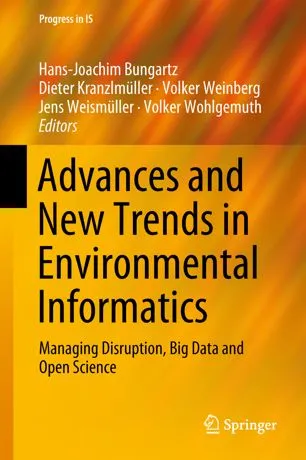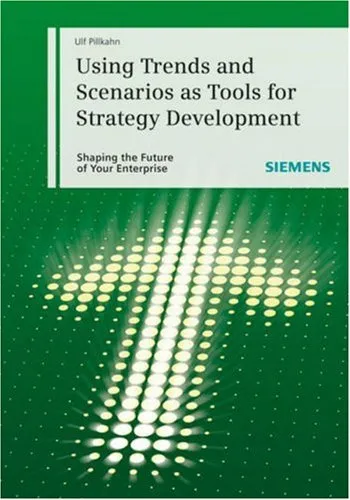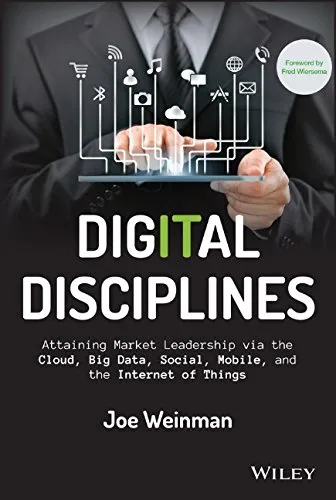Advances and New Trends in Environmental Informatics: Managing Disruption, Big Data and Open Science
4.0
بر اساس نظر کاربران

شما میتونید سوالاتتون در باره کتاب رو از هوش مصنوعیش بعد از ورود بپرسید
هر دانلود یا پرسش از هوش مصنوعی 2 امتیاز لازم دارد، برای بدست آوردن امتیاز رایگان، به صفحه ی راهنمای امتیازات سر بزنید و یک سری کار ارزشمند انجام بدینRelated Refrences:
معرفی کتاب
کتاب «Advances and New Trends in Environmental Informatics: Managing Disruption, Big Data and Open Science» یک اثر جامع و تخصصی است که به بررسی روندها و تحولات نوین در حوزه Environmental Informatics میپردازد. نویسندگان این کتاب با تجربه و تخصص خود در زمینه ترکیب فناوری اطلاعات و مسائل زیستمحیطی، چالشهای منطقی و روشهای نوآورانه را برای مدیریت دادههای کلان (Big Data)، اختلالات محیطی و Open Science مطرح کردهاند. این کتاب به صورت ویژه برای پژوهشگران، دانشجویان و متخصصان طراحی شده است تا درک عمیقتری از ابزارها و روشهای تحلیل دادههای زیستمحیطی کسب کنند.
خلاصهای جامع از کتاب
در این کتاب، نویسندگان به طور سیستماتیک به بررسی چگونگی نفوذ فناوریهای مدرن مانند Big Data و Open Science در تحقیقات زیستمحیطی پرداختهاند. از مدیریت دادهها گرفته تا ساختاردهی فرآیندهای علمی، موضوعات متنوعی پوشش داده شده است. فصلهای مختلف به تحلیل عمیق مفاهیمی مانند Sustainability و نحوه استفاده از ابزارهای پیشرفته در مدیریت اطلاعات زیستمحیطی اختصاص یافتهاند. همچنین، نویسندگان به چالشهای اجتماعی و فنیای که با ظهور فناوریهای جدید به وجود آمدهاند، مانند Ethical Concerns و امنیت دادهها پرداختهاند.
فرآیندهای ارائه شده در کتاب شامل تحلیل دادهها در بسترهای بزرگ و پیچیده، بهرهگیری از الگوریتمهای پیچیده برای پیشبینی بحرانهای زیستمحیطی و بهبود تصمیمگیریهای بلندمدت هستند. نکته برجسته در این کتاب، بهرهگیری از روشهای Open Science برای ارتقای شفافیت و همکاری در پروژههای مرتبط با دادههای زیستمحیطی است.
نکات کلیدی
- بررسی عمیق فناوریهای نوظهور مانند Big Data و کاربرد آنها در موضوعات زیستمحیطی
- پشتیبانی از قابلیت Open Science برای افزایش همکاریهای علمی
- ارزیابی مشکلات اخلاقی و امنیتی مرتبط با مدیریت دادهها
- ارائه ابزارهای تحلیلی بهینه برای پیشبینی روندهای زیستمحیطی
- بحث در مورد روشهای به کارگیری اطلاعات برای بهبود Sustainability
جملات معروف از کتاب
«در دورانی که دادهها به یک منبع مهم از قدرت تبدیل شدهاند، توانمندی در مدیریت و تحلیل دادهها، نهایتاً به مدیریت موثر محیط زیست میانجامد.»
«Open Science نه تنها به دانشمندان امکان اشتراکگذاری یافتههای خود را میدهد، بلکه باعث ارتقای تصمیمگیریهای مبتنی بر داده برای سیاستگذاران میشود.»
اهمیت کتاب
این کتاب اهمیت ویژهای برای علاقهمندان به تقاطع فناوری و مسائل زیستمحیطی دارد. با توجه به پیشرفتهای سریع فناوری دیجیتال و چالشهای بیوقفه محیطی، آگاهی از چگونگی استفاده از دادههای کلان و Open Science میتواند راهکارهای ضروری و کارآمدی ارائه دهد. این کتاب به مخاطبان کمک میکند تا با استفاده از ابزارهای پیشرفته، نیازهای جامعه علمی و سیاستگذاری را برطرف کرده و راهحلهای پایدارتری برای محیط زیست ارائه دهند.
در مجموع، این اثر نه تنها برای پژوهشگران و دانشمندان، بلکه برای سیاستگذاران و مدیران محیط زیست نیز یک منبع ارزنده و راهنما خواهد بود. چشمانداز آیندهای که این کتاب برای کاربردهای Environmental Informatics ترسیم میکند، میتواند تأثیرات مثبتی بر مسائل حیاتی کره زمین داشته باشد.
Introduction
The book "Advances and New Trends in Environmental Informatics: Managing Disruption, Big Data and Open Science" serves as an essential exploration of the intersection between environmental sustainability, digital disruption, and open science. As our global community faces increasingly complex environmental challenges, the role of informatics has grown exponentially. This book delves into how advancements in technology, coupled with strategic data management and collaborative digital workflows, are transforming our approach to tackling critical environmental issues.
The authors – Hans-Joachim Bungartz, Dieter Kranzlmüller, Volker Weinberg, Jens Weismüller, and Volker Wohlgemuth – bring a wealth of expertise and academic rigor to this work, making it both a scholarly resource and a practical guide for those in the fields of environmental science, information technology, and policymaking. With a focus on emerging trends such as big data analytics, the Internet of Things (IoT), and open collaboration, this book addresses key challenges and opportunities for leveraging informatics to foster sustainable solutions.
Divided into thematic sections, the book not only highlights groundbreaking methodologies and tools but also provides actionable insights for researchers, practitioners, and decision-makers. Its relevance spans diverse industries, including academia, governmental organizations, environmental consultancies, and beyond.
Detailed Summary
This book is a comprehensive dive into the evolution of environmental informatics in the era of big data and open science. Starting with the premise that the environmental sector has been disrupted by rapid technological advances, it discusses how society can adapt to these changes and utilize them effectively.
The book unfolds through key themes:
- Big Data: Exploring how the sheer volume and velocity of environmental data can be analyzed and managed to drive better decision-making.
- Open Science: Highlighting collaborative frameworks that make environmental data accessible to a global audience for shared innovation.
- Technological Disruption: Identifying tools and innovations that are reshaping environmental informatics, from AI to blockchain.
- Applications and Case Studies: Examining real-world examples where informatics has been successfully applied to address environmental challenges.
By focusing on the interplay between these areas, the book provides a cohesive understanding of how to navigate and leverage the disruptions caused by technology for sustainable good.
Key Takeaways
- Environmental informatics is at the heart of addressing contemporary environmental challenges.
- Big data and open science are not merely trends but essential pillars for advancing knowledge and fostering innovation in environmental research.
- The book emphasizes interdisciplinary collaboration, as solving global environmental problems requires input from data scientists, policymakers, technologists, and ecologists alike.
- Case studies illustrate the profound impact of technology on ecosystem monitoring, climate modeling, and resource management.
- This resource underscores the ethical and societal responsibilities of using informatics in a way that promotes equity and transparency.
Famous Quotes from the Book
"The most powerful tool we have for addressing environmental challenges is collaboration, and technology is the bridge that connects us all."
"In an era defined by data, it is not the volume of information but the ability to derive meaningful insights that will determine our success in fighting climate change."
"Open science is more than a methodology – it is a philosophy that democratizes knowledge and fosters global innovation."
Why This Book Matters
"Advances and New Trends in Environmental Informatics" is not just another book on environmental technology; it is a call to action for all stakeholders involved in securing a sustainable future. Its importance lies in the unique intersection of technological innovation and environmental stewardship.
This book matters because it addresses urgent real-world issues. Climate change, biodiversity loss, and resource depletion are not challenges we can ignore, and they require innovative solutions rooted in data-driven decision-making. By bridging the gap between emerging technologies and environmental applications, this book offers both the theoretical foundation and practical tools necessary to drive change.
Whether you are a researcher exploring new methodologies, a policymaker crafting strategies for sustainability, or an IT professional interested in environmental applications, this book provides invaluable insights. Furthermore, it pioneers the discussion on ethical data use and equitable knowledge sharing, ensuring that progress in environmental informatics benefits all of humanity.
دانلود رایگان مستقیم
شما میتونید سوالاتتون در باره کتاب رو از هوش مصنوعیش بعد از ورود بپرسید
دسترسی به کتابها از طریق پلتفرمهای قانونی و کتابخانههای عمومی نه تنها از حقوق نویسندگان و ناشران حمایت میکند، بلکه به پایداری فرهنگ کتابخوانی نیز کمک میرساند. پیش از دانلود، لحظهای به بررسی این گزینهها فکر کنید.
این کتاب رو در پلتفرم های دیگه ببینید
WorldCat به شما کمک میکنه تا کتاب ها رو در کتابخانه های سراسر دنیا پیدا کنید
امتیازها، نظرات تخصصی و صحبت ها درباره کتاب را در Goodreads ببینید
کتابهای کمیاب یا دست دوم را در AbeBooks پیدا کنید و بخرید
1219
بازدید4.0
امتیاز0
نظر98%
رضایتنظرات:
4.0
بر اساس 0 نظر کاربران
Questions & Answers
Ask questions about this book or help others by answering
No questions yet. Be the first to ask!














